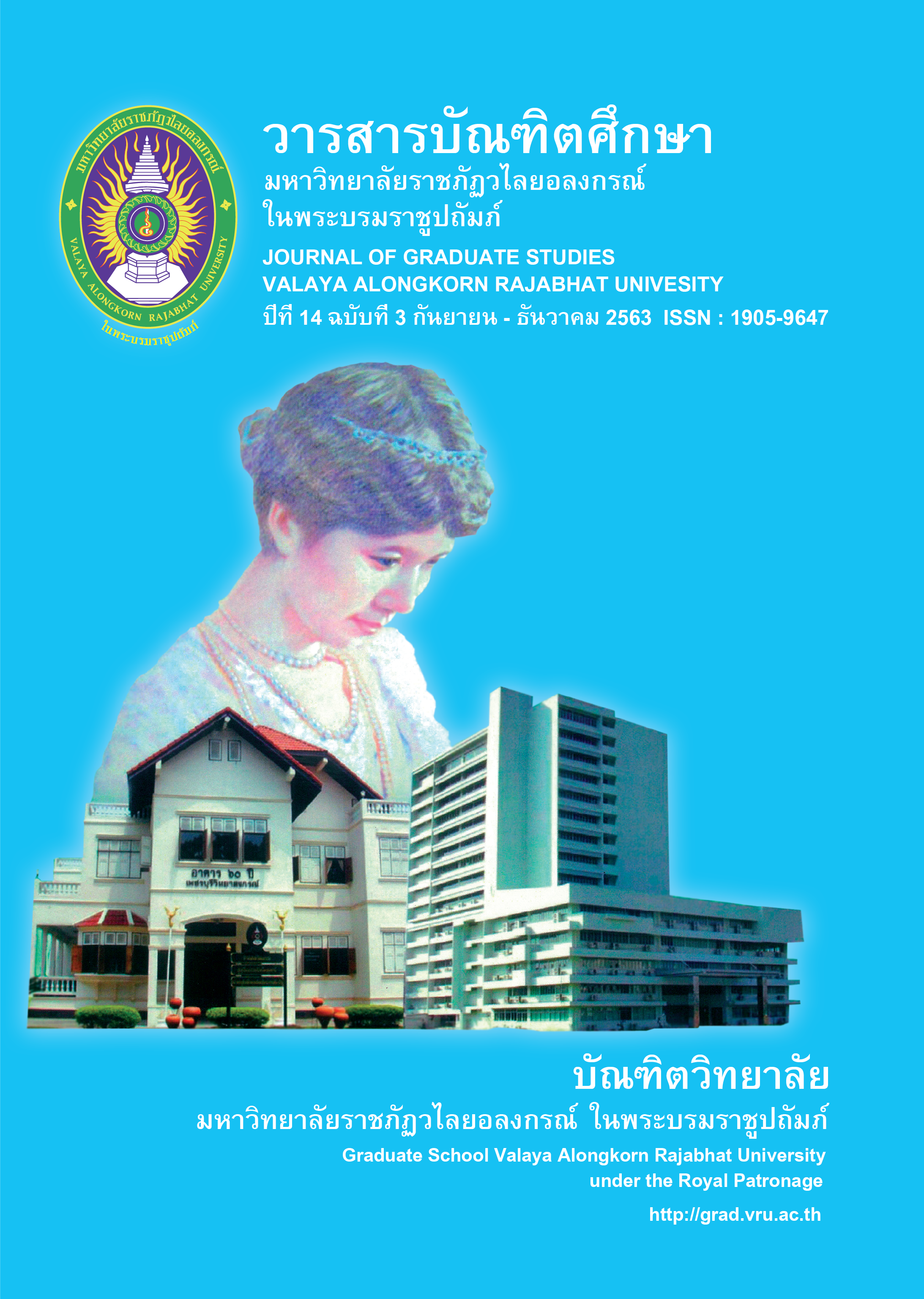แนวทางการจัดการเรียนการสอนที่ส่งเสริมการใช้เทคโนโลยีสารสนเทศและการสื่อสาร อย่างมีคุณธรรมจริยธรรมสำหรับนักเรียนชั้นประถมศึกษา
Main Article Content
บทคัดย่อ
เทคโนโลยีสารสนเทศและการสื่อสารนับเป็นสิ่งสำคัญอย่างหนึ่งที่เข้ามามีบทบาทสำคัญในการดำรงชีวิตของมนุษย์ ทั้งทางด้านการคมนาคม การสื่อสาร เศรษฐกิจ รวมไปถึงด้านการศึกษา ผลกระทบของความเจริญทางด้านเทคโนโลยีมีผลทำให้เด็กในวัยต่าง ๆ เข้าถึงเทคโนโลยีได้ง่ายและรวดเร็ว ซึ่งอาจจะส่งผลเสียและเกิดปัญหาต่าง ๆ ตามมาได้ โดยเฉพาะในเด็กวัยประถมศึกษา ซึ่งเป็นวัยที่มีความอยากรู้อยากเห็น ชอบเรียนรู้จากการลงมือปฏิบัติต่าง ๆ แต่ยังขาดซึ่งประสบการณ์และ ขาดทักษะการคิดอย่างมีวิจารณญาณเท่าที่ควร จึงจำเป็นอย่างยิ่งที่ควรจะมีการปลูกฝังคุณธรรมจริยธรรมด้านต่าง ๆ ซึ่งคุณธรรมจริยธรรมจะช่วยส่งเสริมการใช้เทคโนโลยีสารสนเทศและการสื่อสารให้เหมาะสม ได้แก่ ความมีวินัย ความรับผิดชอบ ความซื่อสัตย์สุจริต ความอดทนอดกลั้น และความเมตตา บทความนี้จึงมีวัตถุประสงค์เพื่อเสนอแนะแนวทางการจัดการเรียนการสอนส่งเสริมการใช้เทคโนโลยีสารสนเทศและการสื่อสารที่สอดคล้องกับคุณธรรมจริยธรรมทั้ง 5 ด้าน ที่กล่าวมาสำหรับนักเรียนชั้นประถมศึกษาในรูปแบบการเรียนการสอนและกิจกรรมต่าง ๆ อย่างเป็นขั้นตอน เพื่อให้ครูและนักการศึกษาที่สนใจสามารถนำไปประยุกต์ใช้ในชั้นเรียน อันจะส่งผลให้ผู้เรียนเกิดการเรียนรู้และเข้าใจการใช้งานเทคโนโลยีสารสนเทศและการสื่อสารอย่างมีคุณธรรมจริยธรรม และเติบโตเป็นแบบอย่างและเป็นพลเมืองดิจิทัลที่ดีของโลกต่อไป
Article Details

อนุญาตภายใต้เงื่อนไข Creative Commons Attribution-NonCommercial-NoDerivatives 4.0 International License.
บทความทุกเรื่องได้รับการตรวจความถูกต้องทางวิชาการโดยผู้ทรงคุณวุฒิ ทรรศนะและข้อคิดเห็นในบทความ Journal of Global of Perspectives in Humanities and Social Sciences (J-GPHSS) มิใช่เป็นทรรศนะและความคิดของผู้จัดทำจึงมิใช่ความรับผิดชอบของบัณฑิตวิทยาลัย มหาวิทยาลัยราชภัฏวไลยอลงกรณ์ ในพระบรมราชูปถัมภ์ กองบรรณาธิการไม่สงวนสิทธิ์การคัดลอก แต่ให้อ้างอิงแหล่งที่มา
เอกสารอ้างอิง
Arend, R. I. (1998). Resource handbook learning to teach. (4th ed.). Boston, MA: McGraw-Hill.
Barrows, H. S. and Tamblyn, R. M. (1980). Problem-based learning: An approach to medical education. New York: Springer Publishing Company.
Bonkham, P. (2018). dek yuk mairūthao than sư̄dičhithan [Digital Media for new generation children]. Retrieved fromhttp://wow.in.th/iC5b.
Buddhadasa Bhikkhu. (2010). mēttā thān kānhai mī phon penkhwām suk yāng ying [Kindness makes you happy]. Bangkok: Thammasapa.
Chalakbang, W. (1992). čhittawitthayā læ kān nænǣo dek prathomsưksā [Psychology and Guidance for elementary students]. Bangkok: O. S. Printing House.
Chatsupakul, K. (2004). kānsưksā læ kānphatthanā khunnatham læ čhariyatham khō̜ng dek læ yaowachon Thai (radap prathom sưksā) [A study and develop of morals and ethics in Thai children (Elementary)]. Bangkok: Srinakharinwirot University.
Khemmani, T. (2011). sāt kānsō̜n ʻongkhwāmrū phư̄a kānčhat krabūankān rīanrū thī mī prasitthiphāp [Teaching science: Knowledge for Organizing Effective Learning Processes]. Bangkok: Chulalongkorn Press.
Kohlberg, L. (2000). Development of Moral Character and Moral Ideology Review of Child Development Research. New York: Russell Sage Foundation.
Ministry of Foreign Affairs. (2006). tūayāng bāng tō̜n khō̜ng phra rāt damrat læ phra bō̜rom rāchōwāt khō̜ng phra bāt somdet phračhaoyūhūa thī song phrarātchathān nai warōkāt tāng tāng [The Royal speech of His Majesty King Bhumibol Adulyadej]. Retrieved from http://www.mfa. go.th/web/240.php.
Office of the National Economic and Social Development Board. (2011). phǣn phatthanā sētthakit læ sangkhom hǣng chāt chabap thī sip Phō̜.Sō̜. sō̜ngphanhārō̜ihāsip 2554 [National Economic and Social Development Plan, 10th edition, 2007 – 2011]. Retrieved from http://www.nesdb.go.th/download/ article/article_20160323112418.pdf.
Phra Brahmagunabhorn (P. A. Payutto). (2008). phut tham chabap prapprung læ khayāi khwām: matchēna thamthētsanā / matchimāpatipathā rư̄ kot thammachāt læ khunkhā samrap chīwit [Buddhist Dharma: The sermon/ Middle way or natural law and value for life]. Bangkok: Mahachulalongkorn rajavidyalaya University.
Phra Thammakittiwong. (2004). lakkān phatthanā ton [Principles of self-development]. Retrieved from http://www.parliament.go.th/moral/hrdtric5.pdf.
Piaget, J. (1997). The Moral Judgment of the child. London: Routledge & Kegan Paul Ltd.
Rodkroh, P. (2015). kānwičhai læ phatthanā kēm dičhithan kānsưksā bǣp chai panhā pen thān phư̄a sœ̄msāng khwāmsāmāt nai kān kǣ panhā nai wichā witthayāsāt samrap nakrīan prathom sưksā [Research and development of a problem-based learning digital game to enhance problem solving ability in science subject for elementary students]. Doctoral dissertation. Chulalongkorn University.
Rodkroh, P. (2017). kānčhatkān rīanrū radap prathom sưksā dōi chai panhā pen thān. [Problem-based Learning for Elementary students]. Journal of Education Silpakorn University. 15(2), 15 – 28.
Royal Institute. (2003). photčhanānukrom chabap rātchabandit sathān Phō̜.Sō̜. 2542. Bangkok: Nanmeebooks.
Sattayatam, P. (2014). kānsō̜n čhariyatham samrap yaowachon [Teaching Ethics for Youth]. Bangkok: Chulalongkorn Press.
Somdet Phra Nyanasamvara. (2010). mēttā thān kānhai mī phon penkhwām suk yāng ying [Kindness makes you happy]. Bangkok: Thammasapa.
The Institute for the Promotion of Teaching Science and Technology. (IPST). (2007). rūpbǣp kān rīan kānsō̜n thī phatthanākara būan kān khit radap sūng wichā chīwawitthayā radap chan matthayommasưksā tō̜n plāi [A teaching model for development of high level thinking processes in biology of upper secondary school students]. Retrieved from http://www.ipst.ac.th/biology/Bio-Articles/mag-content10.html
Werakultawan, S. (2018). thaothan sư̄ ʻamnāt nai mư̄ phonlamư̄ang dičhithan. [Media Literacy]. Bangkok: Wanida Press.


